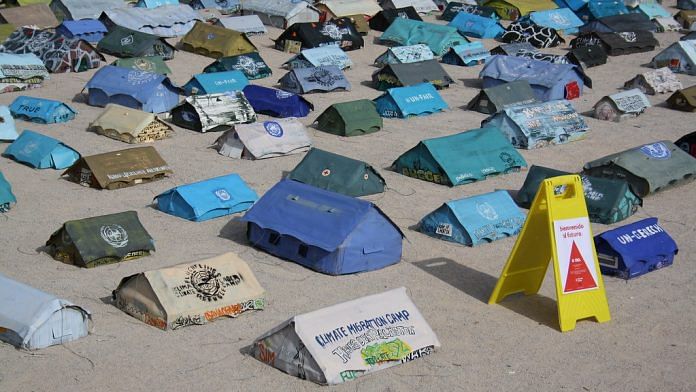Almost a third of all humans may have to leave their homes and migrate to cooler climates to avoid extreme heat if we don’t act to halt climate change or mitigate its effects, a new report warns.
This latest estimate of the potential number of people who may be forced to become climate refugees dwarfs all previous forecasts. As recently as September 2021, the World Bank put the likely figure at 216 million.
But now an international team of scientists have produced a report that warns that, if nothing is done to slow climate change, 3.5 billion people may have to leave their homes in the next 50 years to escape average temperatures of over 29C.
They say that even if global warming is restricted to 2C – which is 0.5C above the target set in the 2015 Paris climate agreement – around 1.5 billion people could be driven to become climate refugees from the hottest parts of the world.
“As the potentially most affected regions are among the poorest in the world, where adaptive capacity is low, enhancing human development in those areas should be a priority alongside climate mitigation,” the report adds.
Also read: Here’s how to build sustainable, healthier, more equitable food systems: WEF founder
What is the ‘human temperature niche’?
The study says that, just like other creatures on Earth, the majority of humans have tended to settle in places where the temperature range is optimal for human life – what the researchers call the “human temperature niche”.
“For thousands of years, humans have concentrated in a surprisingly narrow subset of Earth’s available climates, characterized by mean annual temperatures around 13C,” they say. “All species have an environmental niche, and despite technological advances, humans are unlikely to be an exception.”
“This strikingly constant climate niche likely represents fundamental constraints on what humans need to survive and thrive,” said Professor Marten Scheffer of Wageningen University, one of the report’s authors quoted in the Financial Times.
But the scientists say that global warming caused by climate change is set to cause the geographical position of the human temperature niche to shift more over the next 50 years than it has moved in the past 6,000 years.
They calculate that every 1C rise in global temperatures will leave one billion people living in areas where temperatures exceed the human niche – and rising sea levels and extreme weather events will compound the impact on people in these regions.
It’s not too late to curb climate change
“Migration can have beneficial effects to societies, including a boost to research and innovation. However, on larger scales, migration inevitably causes tension, even now, when a relatively modest number of 250 million people live outside their countries of birth,” the report adds.
The scientists insist that the events they describe are not inevitable. “It is not too late to mitigate climate change and to improve adaptive capacity, especially when it comes to boosting human development in the Global South,” they add.
“The good news is that these impacts can be greatly reduced if humanity succeeds in curbing global warming,” said report co-author Professor Tim Lenton of Exeter University, in the Financial Times.
This article was originally published in the World Economic Forum.
Also read: Like pandemic, climate fight will test govts’ ability to adapt. We must not fail this time



